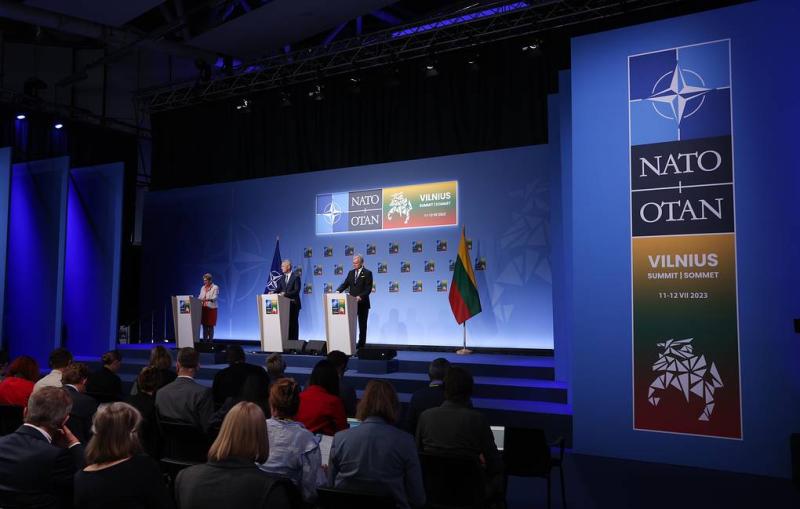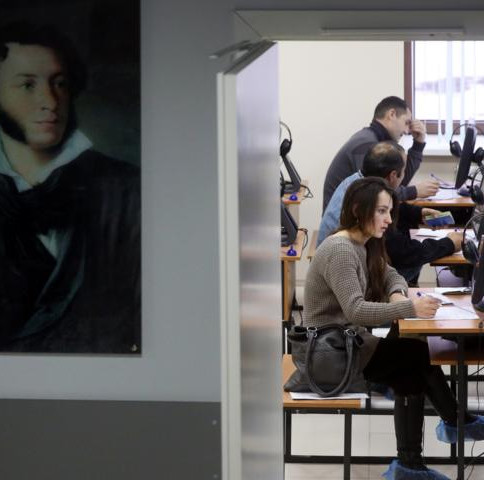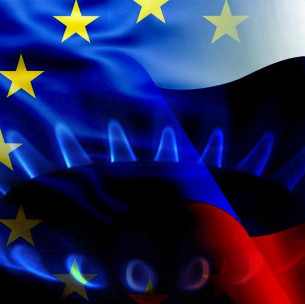
© Paul Ellis/Pool Photo via AP/TASS
Top stories from the Russian press on Wednesday, July 12th, prepared by TASS
NATO membership prospects of Sweden and Ukraine top bloc’s summit agenda in Vilnius; Russia remains a welcome partner for ASEAN member states; and Russian lawmakers agree with Chinese counterparts on shared worldview between Moscow and Beijing. These stories topped Wednesday’s newspaper headlines across Russia.
Media: Ukrainian roulette: Stockholm and Kiev’s NATO accession prospects top summit agenda
This year’s annual NATO summit kicked off in Vilnius, Lithuania, on July 11 with Sweden’s membership application and support for Ukraine topping the agenda. However, the alliance’s leaders are still shying away from inviting Ukraine to join the bloc despite member states’ unprecedented largesse in providing an ever-expending array of military and political support for the Kiev regime.
NATO member countries have agreed on the terms of Ukraine’s accession to the alliance, NATO Secretary General Jens Stoltenberg said. Kiev will be invited to join after meeting all conditions and attaining the unanimous consent of the bloc’s 31 members, he said.
The parameters of Ukraine’s prospects for joining NATO are not something extraordinary, Dmitry Ofitserov-Belsky, a researcher at the Russian Academy of Sciences’ Primakov Institute of World Economy and International Relations (IMEMO RAS), said in a conversation with Vedomosti. This follows from the fact that the alliance is not yet ready to arm Ukraine to the level ensuring normal interoperability on equal terms with other bloc members. Without that, cooperation within the NATO framework is hardly feasible, the expert thinks.
The US-led bloc is trying to formulate something that is both acceptable to the Kiev regime and would not be strictly binding on the current members, and, moreover, would not interfere in future negotiations with Russia, military expert Alexander Yermakov told Vedomosti. In his opinion, the freshly minted Ukraine-NATO Council is reminiscent of the Russia-NATO Council, and thus there is no reason to think that such a body would potentially be any more effective, he added.
However, it would be erroneous to think that Ukraine is unwelcome in NATO. On the contrary, if Kiev manages to weather another year in the conflict with Russia, then the issue of its membership would re-emerge at a more serious level, Ofitserov-Belsky contends. In his opinion, the alliance is really interested in Ukraine, above all, as a convenient strategic foothold in the East.
Another important agenda item at the Vilnius summit is Sweden’s accession to the alliance. The story with Sweden’s membership has been dragging on since June 2022. Emre Ersen, professor in political science and foreign affairs at Marmara University, is not sure that Stockholm will actually fulfill the promises it has made to Ankara in exchange for the latter’s acquiescence. He told Izvestia that he thinks talks between Turkey and Sweden will continue behind closed doors until the Turkish parliament formally ratifies Sweden’s accession protocol, thus making Sweden’s membership a done deal.
Nezavisimaya Gazeta: Russia remains desirable partner for ASEAN members
Indonesia, which is chairing a meeting in Jakarta of top diplomats from member states of the Association of Southeast Asian Nations (ASEAN), has cautioned that the regional group will lose its relevance if it fails to bolster its unity. Behind this statement is the message that the group should overcome differences among members regarding interacting with Myanmar’s ruling military junta and dealing with territorial disputes in the South China Sea.
The Jakarta conference drew global attention because it will be followed by the East Asia Summit and ASEAN’s regional forum, which will be attended by Russian Foreign Minister Sergey Lavrov and US Secretary of State Antony Blinken. An additional twist of intrigue stems from the fact that China will be represented not by Foreign Minister Qin Gang but by Wang Yi, director of the Foreign Affairs Commission Office of the Chinese Communist Party Central Committee.
In a conversation with Nezavisimaya Gazeta, Alexander Lomanov, deputy director of the Russian Academy of Sciences’ Primakov Institute of World Economy and International Relations (IMEMO RAS), noted: "Qin Gang was appointed [foreign] minister quite recently. It is extremely unlikely that some internal differences have accumulated between foreign policy officials. Ministers also get sick. As for China’s policy in the region, then its goals are clear. Beijing is interested in having the fewest possible countries in its periphery plugged into US plans for containing China and supporting Taiwan. This is a problem that is sure to escalate. ASEAN countries do not wish to take a position on either side. However, in a situation where the US is prodding them to resume bloc-based policies, it is becoming increasingly difficult to continue their balancing act."
In a conversation with the newspaper, Alexey Drugov, lead researcher at the Russian Academy of Sciences’ Institute of Eastern Studies, pointed out that Russia has retained deep, time-tested relations with Southeast Asian countries and the level of such ties can be maintained despite the US and its allies trying to isolate Moscow. According to some surveys, 68% of Indonesians sympathize with Russia, and not with Ukraine. The US is not loved or trusted in Indonesia while Russia is viewed as a counterbalance to American influence. However, the country is concerned about differences with Beijing over the South China Sea. Indonesia is trying to remain equidistant from both the US and China. However, in the field of military and technical cooperation it has recently bolstered its ties with the US, the expert concludes.
Izvestia: Senior Russian parliamentarian responds to NATO aggression during China visit
Russia and China are not discussing the use of nuclear weapons in the special military operation in Ukraine, as this subject "was not and is not possible," Valentina Matviyenko, speaker of Russia’s Federation Council, or upper house of parliament, told reporters on July 11 during her visit to China. Nevertheless, the topic of the special military operation still came up. Moreover, China’s peace plan for settling the conflict is similar to Russian approaches to resolving it, but Moscow does not yet see any favorable factors for launching negotiations due to intentional stalling of the process by the collective West and NATO, the top-ranking Russian senator stressed.
The 8th meeting of the Inter-Parliamentary Commission on Cooperation Between the Russian and Chinese Parliaments on July 11 became an important event for the partnership between Moscow and Beijing. Representatives from Russia and China discussed how the confrontation between democracy and unipolar dictatorship is shifting into a "hot phase." Senator Andrey Denisov, who served as Russia’s envoy to China for nearly ten years, said that the SCO [Shanghai Cooperation Organization] and BRICS [Brazil, Russia, India, China, South Africa] platforms constituted the key elements of the evolving world order for both countries. That said, both the Russian and Chinese delegates noted the universal coordinating role played by the UN in maintaining global security and stability.
Both countries have similar views of the world order, the assembled parliamentarians noted. Currently, it is precisely Beijing that could become Moscow’s core external partner, so Russia can be expected to take further steps toward promoting bilateral interests, Andrey Vinogradov, head of the Center for Modern China Studies at the Institute of Eastern Studies, told Izvestia.
Nezavisimaya Gazeta: Can common BRICS currency exist without India?
A fight is clearly brewing over plans to create a new common currency for mutual trade settlements among the BRICS countries (Brazil, Russia, India, China, South Africa). On Tuesday, Indian authorities announced that they would not participate in the project to create a new BRICS currency, which would have the effect of reducing use of the US dollar in international trade payments. The ball is now in China’s court, although Beijing is under no obligation to kowtow to New Delhi’s policy line. Regardless of what Indian officials decide, many countries worldwide would like to decrease their risks of using the US dollar, which are clearly illustrated by the hit that Russia has taken.
The idea of creating a partially gold-backed currency has also given rise to doubts. "Any national currency should be backed by something for its own stability and even convertibility. In the past, this used to be gold and silver reserves; now, it is more likely to be a country’s GDP, that is, actual products and services produced in the issuer country. And if the volume of issued currency, as is the case with the dollar, is not supported by GDP, then there is a higher-than-zero probability of this currency facing a crisis and depreciation," said Valeria Minchichova, associate professor in the Department of Global Economy and International Business at the Financial University under the Russian Federation Government.
Attempts to tie any new currency to the gold standard are destined to fail, asserted Natalya Milchakova, lead analyst at Freedom Finance Global. "If this was possible, then the dollar would have been backed by gold a long time ago, as it was with the Bretton Woods system, or some other currency, for example, the euro or yuan, would be backed by gold. Yet, this is unrealistic, the more so in the BRICS, where inflation has always been much higher than in Western or G7 countries," she stressed. According to the expert, in order to implement such an idea, enormous volumes of gold currency reserves would be needed in all countries participating in the project. "Nowadays, it is simply impossible to build a new financial system based exclusively on gold. The capitalization of the entire gold market is only $12 trillion, which is not enough to service all financial flows due to the relatively low volume," added Andrey Stolyarov, associate professor in the Financial Markets Infrastructure Department at the Higher School of Economics (HSE University).
"Western Europe has been transitioning to a common currency for over three decades, and already has coordinated macroeconomic, taxation and customs policies, and, most importantly, a common territory with shared borders. But not only are the BRICS countries dispersed over different continents, they also belong to absolutely different economic systems with varying traditions, business practices and legislative restrictions," Minchichova stressed.
Vedomosti: Russia becomes largest foreign market for Chinese automakers
According to data from China’s General Administration of Customs, gathered by the China Association of Automobile Manufacturers, from January through May 2023, China exported approximately 287,000 vehicles to Russia, the Chinese Phoenix news portal reported, while in the previous year China exported about 162,000 cars to Russia.
According to the news outlet, in monetary equivalent the import of Chinese cars to Russia increased five-fold in January-May 2023 versus the same period last year, to $3.57 billion versus $685 million.
The Russian market is very important to China because, essentially, this is the first example of a large-scale expansion by Chinese automakers outside of their home market, said Sergey Lukonin of the Center for Asia-Pacific Studies. Luxury vehicle makes and models have not yet entered the Russian market, although they have been announced, he added. According to Lukonin, in many ways, China’s success is aided by the exit of Japanese and Korean automakers. Despite a lingering mistrust among some Russian motorists toward Chinese car makes, their quality has already approached that of European vehicles, the expert concluded.
All of China’s main automakers, with some exceptions, continue working in Russia, added independent automotive expert Sergey Burgazliev. According to his estimates, given the current trend, over 500,000 vehicles may come to Russia from China this year, which is a substantial figure. The expert added that the volumes will continue to grow because, nowadays in Russia, there are practically no alternatives to Chinese cars, with the exception of some Korean makes and models, since no cars from Europe or Japan are being officially exported to Russia. The expert thinks that the growth trend for sales of Chinese cars will remain constant even if their sticker prices rise after the August introduction of mandatory recycling fees on all new or imported vehicles.









